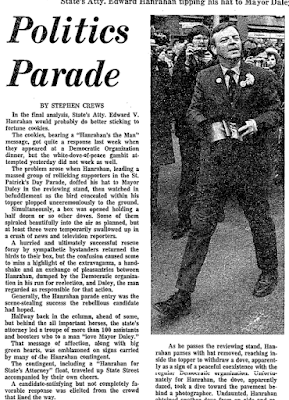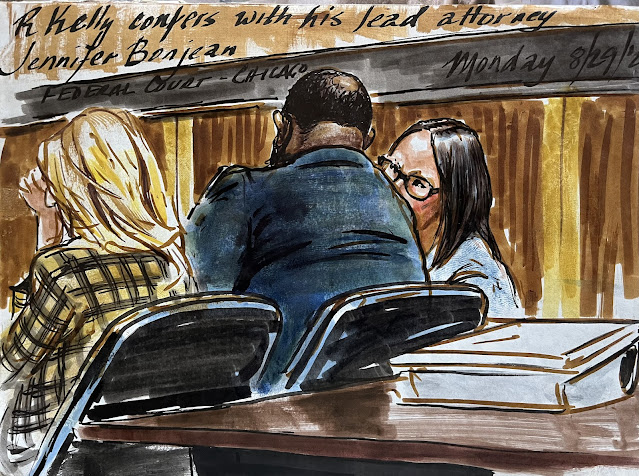
What is our responsibility to the past? To preserve it, of course. Because if history isn't passed along, then it's lost irrevocably, and the present isn't always a good judge of what is important, what insignificant.
The thing about the past, though, is there's so much of it. You can't preserve everything. What to hold onto? What to let go? Words and images can gather in an endless collection of files without jamming our capabilities. But not everything is stories and pictures. There is stuff, and lots of that, too. What to do with it?
I met a neighbor for breakfast at Leonidas last week, the cute little Belgian chocolate shop a few blocks from my house. An almond croissant, a cup of joe, and all was right with the world. He came bearing a gift: a round plastic container holding the cookie above. With it, came a story, related to Ed Hanrahan, who 50 years ago was the Cook County State's Attorney. I knew the part about Hanrahan leading the Dec. 4, 1969 raid against the apartment where Black Panther leader Fred Hampton was sleeping, killing him and an aide, Mark Clark. My neighbor filled in some interesting details, such as that the cops on the raid were not regular Chicago police, but Cook County State's Attorney police, older, semi-retired, not particularly skilled at what they did.
The murders — Hampton died in a fusillade of bullets, Hanrahan lied and claimed it was a fierce gunfight, pointing to nail heads in the wall and pretending they were bullet holes from Black Panther fire — scuttled Hanrahan's political career, in the way Rahm Emanuel's wrecked on the killing of Laquan McDonald. The then-powerful Democratic Party wouldn't slate him.
But he did not go quietly. He ran without party endorsement. As part of his efforts, Hanrahan marched in the St. Patrick's Day Parade, and arranged some piece of hokey business where he paused in front of Mayor Daley and doffed his top hat, whereupon a white dove of peace was to fly out. Only the poor bird, no doubt nearly smothered in its confinement, merely tumbled dazed to the street, a classic political moment if ever there were.
As part of Hanrahan's similar flailing efforts to rehabilitate himself, my fellow Northbrookite, then a wisp of a young operative, donned a white busboy tunic and slipped into the banquet hall where a Democratic dinner was about to be held and set one of these green fortune cookies at each place setting. I guess the idea was the party stalwarts would see the cookie, smile, and conclude that yes, indeed, Hanrahan is the man.
It worked, kind of. Democratic voters, who can be a forgiving lot, gave the nomination to Hanrahan, who promptly lost to Republican Bernard Carey in the general election.
Though notice how the story — which must no longer be familiar to many after the scouring hand of time rubbed it away for half a century — is evoked by the cookie, which he had guarded for 50 years. My friend was in the process of unburdening himself of such ephemera (And burdening me with it, I thought, accepting the token). He didn't intend on me to keep it, but his idea was for me to convey the cookie to Mike Sneed, the Sun-Times gossip columnist who at the time was a Tribune gossip columnist and, he said, reported on the cookie prank.
I didn't find any evidence of that, though I did find mention of the cookie caper. With our office on North Racine shutting down next week, ahead of our move to Navy Pier and the Old Post Office, and rolling dumpsters being filled with crap, I couldn't see conveying this lone cookie to work and trying to find it a home. My colleagues would think I'd gone mad. My initial thought was to simply mail it to Sneed and be done with it. But that would require a small investment of time and money, so I dashed off an email: do you want this?
"Good grief! He kept the molding cookie all this years?" she replied, neatly expressing my own thoughts. "Did he tell you what the gag was or just a campaign cookie at a political event? I can still hear Ed’s laugh. It was everything Irish back then. I think I was in my 20’s still when Ed was in office. .. Now in my dotage, I am trying to toss the dross of my newsie past. I will now choose to give the cookie a pass."
Smart woman. Can't say I blame her. But I am nothing if not a conscientious steward of the past. I went online, where the Chicago History Museum has a form where you can offer to donate artifacts related to the city's past to the museum's collection. I'm not expecting them to send curator's with white gloves, but I could see this cookie being part of some exhibit on political mischief. Staffing being what it is, I figure I'll hear from the museum in a matter of weeks or months or never. Until then, my office at home is such an uncurated clutter of crap that another cookie more or less won't matter. Once it's gone, it's not like it could be easily replaced, and I imagine the city isn't silly with them after half a century. Though you never know.













